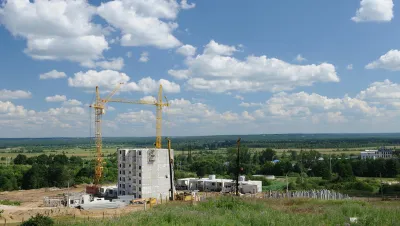A new paper by the People's Policy Project explains why and how a government-owned municipal housing development, i.e., social housing, can address the nation's housing affordability crisis.

Peter Gowan and Ryan Cooper pitch a program of government-owned municipal housing development, which they argue would address the need to increase the number of affordable dwellings in high cost cities in the United States. "Unlike traditional American public housing, all city residents will be eligible to live there," according to Gowan and Cooper.
The article's case for what it calls social housing begins by touting its ability to release price pressure and deliver units at scale to meet the needs of more than just the very top of the market. This isn't the "filtering" argument of market urbanists, however—"not only is that an unreliable procedure (many very old buildings remain expensive), it will take decades to happen."
The second line of argument is that "by allowing people of all incomes to apply to live in these new developments, local governments will be able to charge higher rents to higher-income residents, and thus capture a great deal of capital income."
According to Gowan and Cooper, such a housing policy would only be innovative in the United States. Sweden, Finland, and Austria are referenced. Sweden is also cited as the benchmark for a goal by the United States: "We suggest that 10 million new municipal housing units would be a viable 10-year goal. That is well short of a scaled-up version of the Swedish program, but still quite aggressive. We do not anticipate a U.S. affordable housing oversupply being a significant risk in the medium term."
The article concludes with more details about how a municipal housing program could work in the United States.
The study by Gowan and Cooper has been picked up by multiple media outlets, like The Guardian and Jacobin.
FULL STORY: A Plan to Solve the Housing Crisis Through Social Housing

Analysis: Cybertruck Fatality Rate Far Exceeds That of Ford Pinto
The Tesla Cybertruck was recalled seven times last year.

National Parks Layoffs Will Cause Communities to Lose Billions
Thousands of essential park workers were laid off this week, just before the busy spring break season.

Retro-silient?: America’s First “Eco-burb,” The Woodlands Turns 50
A master-planned community north of Houston offers lessons on green infrastructure and resilient design, but falls short of its founder’s lofty affordability and walkability goals.

Test News Post 1
This is a summary

Analysis: Cybertruck Fatality Rate Far Exceeds That of Ford Pinto
The Tesla Cybertruck was recalled seven times last year.

Test News Headline 46
Test for the image on the front page.
Urban Design for Planners 1: Software Tools
This six-course series explores essential urban design concepts using open source software and equips planners with the tools they need to participate fully in the urban design process.
Planning for Universal Design
Learn the tools for implementing Universal Design in planning regulations.
EMC Planning Group, Inc.
Planetizen
Planetizen
Mpact (formerly Rail~Volution)
Great Falls Development Authority, Inc.
HUDs Office of Policy Development and Research
NYU Wagner Graduate School of Public Service




























